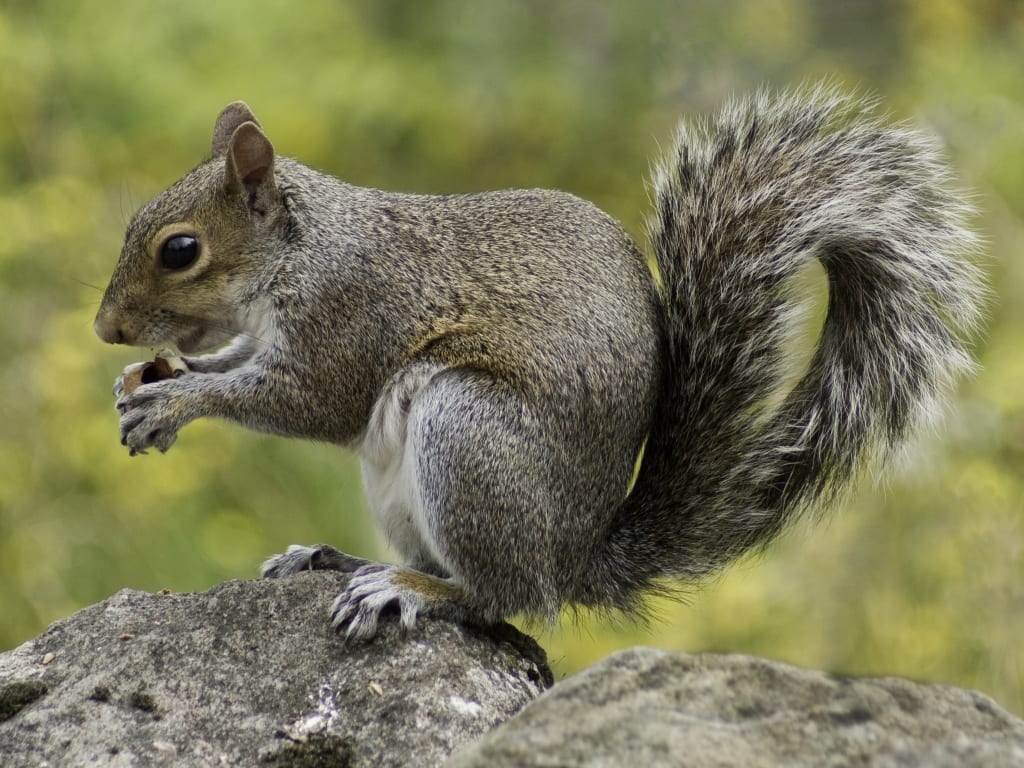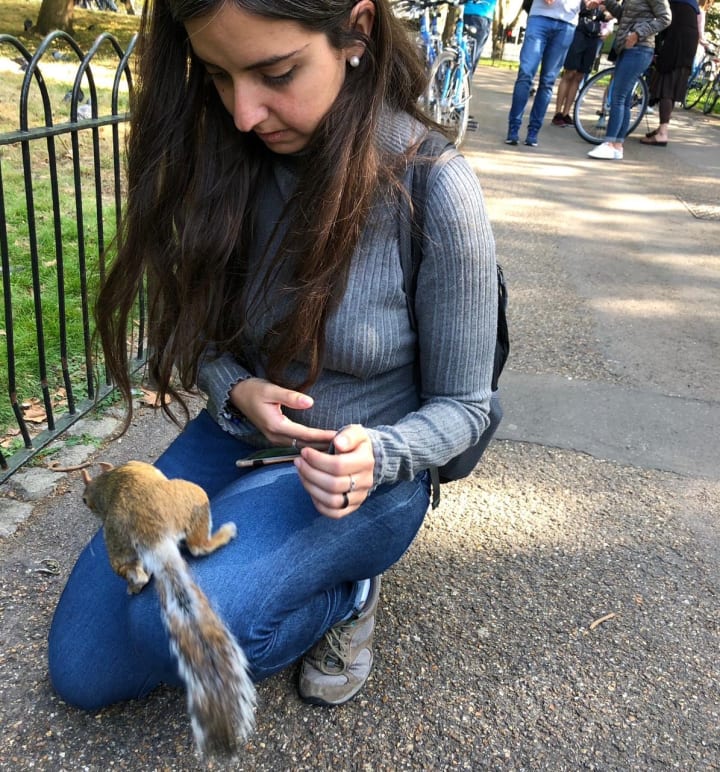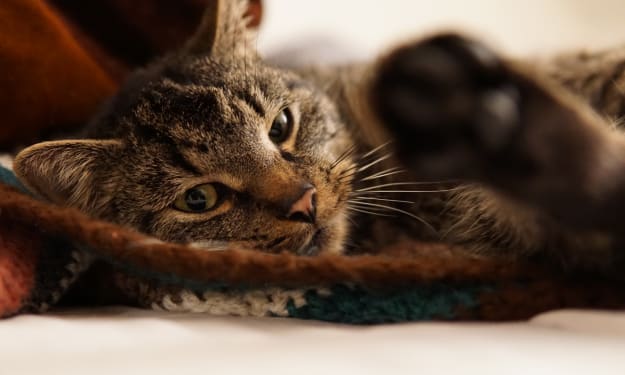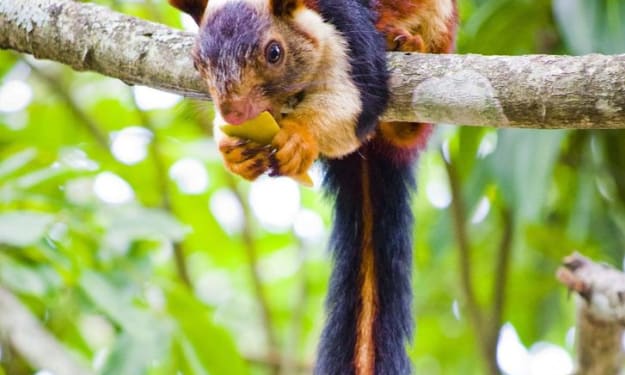Swish and Flick: Fascinating Facts About Squirrels (and Their Tails)
Do you like squirrels? You'll want to read this!

I'm an animal lover. I love pets and wild animals. I was a vegetarian for years because of animals. As a child, I loved watching Animal Planet and the Discovery Channel (remember Henry's Amazing Animals?). Years ago, during college, I even started an animal fan page. Unfortunately, as it happens, adulthood got very busy and I left some of my hobbies behind.
But, here I'm back with some fascinating animal facts!
Last year, I was studying for a master's degree in London. One of my favorite things was going to the park to watch and feed the squirrels! They are just lovely, with their little jumps and fluffy tails. It's hard not to love them. Can you relate?
Here's a photo of one of my favorite squirrel moments:

If, like me, you love or are curious about squirrels, here's a question: Did you know squirrels communicate with their tails?
All animals have special features which are important for their communication and survival. Squirrels’ fluffy and bushy tails have specific functions (apart from making them look very cute, of course!). From protecting them against cold or hot weather, to regulating their balance for jumping and climbing. Tail movements, like wagging, flicking or twitching, have different meanings depending on the situation.
Most importantly, how squirrels move their tails is a sign of their emotional state. Speak about tell-tail signs! When a squirrel shakes its tail, it means that it's trying to say something.
Tail flicking is usually how squirrels communicate with other squirrels. During breeding season, squirrels can use tail movements for reproductive purposes. They will do a little ‘tail dance’ in order to call the attention and attract potential mates.
Tail shaking can also be a warning for other squirrels to stay out of their territory or away from their food. Most often, if squirrels move their tails while sitting, it's a sign of awareness of their surroundings. Squirrels will shake their tails and move in a zig-zag path when cautiously exploring a new place or object. They do this to confuse any potential predators. Although they may initially stay motionless, squirrels will also shake their tails as a way of communicating their state of alert when predators are nearby, signaling their intention to flee, and warning other squirrels about the danger. They may quickly get to safety and wave their tails back and forth to appear more menacing. This behavior is called “flagging”.
Squirrels also shake their tails when they are startled, and especially when they are scared. Their tails will twitch frantically in panic when they are trapped or threatened, and when they or their young are at risk.
As mammals, like humans, squirrels experience emotions that they can express and upon which they act. These include curiosity, excitement, frustration and fear. For example, researchers at the University of Berkley in California noticed that, after following a set obstacle path leading to a locked food box, squirrels rapidly flicked their tails in frustration when they failed to open it, also warning other squirrels to avoid it.
Little known fact: Squirrels' brains are slightly larger than a peanut, but they're incredibly smart animals.
In fact, research suggests that they can be more organized that you and me. The same department at Berkeley studied how squirrels, with their sharp instinct, can identify acorns that are higher in fat (and therefore will last longer through the winter). Also, when the squirrels were given different types of nuts (like almonds, hazelnuts, peanuts and walnuts) they sorted them immediately and hid them in specific places by category.
Additionally, squirrels can remember where they hide their nuts, instead of relying only on smell to find them. According to scientists, during the fall season, the hippocampus of squirrels (the brain area that controls memory and spatial organization) can expand up to 15% due to the amount of brainpower they need to sort and locate their reserves for the winter.
That's nuts!
Speaking of smart squirrels and big challenges: If you want to see more action than on "Mission Impossible: Ghost Protocol", you have to watch Mark Rober's funny take on building a squirrel-safe bird feeder.
How incredible are these animals? This video showcases squirrels' intelligence, skill and athleticism. And it's full of squirrel facts! If you watched it, you can also see the importance of squirrels' tails in keeping balance and direction, and propelling these little furballs through the air like pro stunt performers. They even know how to fall in ways that minimize injury or damage. Nature is just unbelievable, isn't it?
I really hope that you enjoyed these rare and amazing squirrel facts!
On an extra note: If you love squirrels, I recommend listening to this musical love letter to these furry friends by composer Andreas Wolff.
The piano is very uplifting and relaxing, and I can totally hear the squirrels skipping around in this piece!
Now, squirrel lovers...
...and enjoy!
I hope you liked this article! If you did, please give it a like (if you're a Vocal member) and share it with your friends and family. Tips of all sizes are greatly appreciated.
Your support, in any kind, means a lot to me as a writer.
Love, Marina
About the Creator
Marina Fortuño
I'm a work in progress! I love writing for fun (mainly short stories, informative bits and heartfelt pieces to make people happy).
This is my personal writing page.
Find me:
TW: @marina_writing







Comments
There are no comments for this story
Be the first to respond and start the conversation.